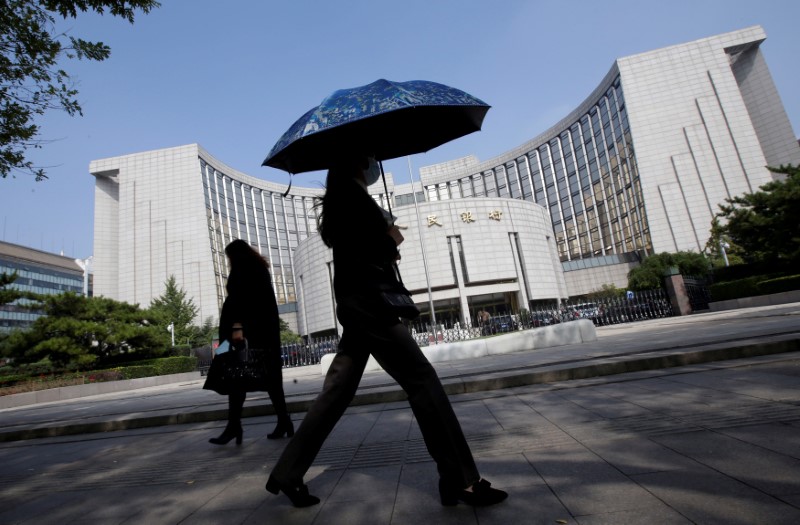By Tommy Wilkes
LONDON (Reuters) - It was meant to be the first year in nearly a decade that the world's central banks took more cash out of markets than they pumped in. Instead, China -- and slowing growth elsewhere -- may ensure yet another year of positive liquidity flows.
It will still be a momentous year for markets hooked on cheap money provided by the U.S. Federal Reserve and its counterparts in the euro zone, Britain, Japan and elsewhere. Those four central banks are expected to cut the size of their balance sheets by more than $200 billion.
But China, which last week cut reserve requirement ratios for its banks by 100 basis points, has upended expectations that aggregate global liquidity from central banks will be negative for the first time since 2011.
Its easing means more money will still be going into markets this year from central banks than coming out, said Steve Donzé, senior macro strategist at Pictet Asset Management.
Donzé had predicted last August that global liquidity worth a net $100 billion would be removed in 2019. Now he expects $140 billion to be added instead -- thanks to Chinese authorities' scramble to support their slowing economy.
"We had expected the PBOC (People's Bank of China) to ease more last year, but China is slowing more rapidly than elsewhere in the world," Donzé said. "The direction of travel is now very clear."
For a graphic on central bank balance sheets: https://tmsnrt.rs/2vWTPCE
DELICATE CHINA
China's reserve ratio cut was the fifth in a year but the largest, estimated to free the equivalent of around $116 billion for lending. Taken together, the five cuts ensure more than 3 trillion yuan ($439 billion) in liquidity, ratings agency S&P estimated.
But could it be that China won't be alone in blinking at signs of economic weakness?
The ECB ended its three-year-long stimulus program at the end of last year. The Fed has been rolling $50 billion worth of bonds off its balance sheets every month since October. (Central bank liquidity: https://tmsnrt.rs/2SI1HCx)
But investors -- and possibly central bankers -- are growing worried about signs of economic slowdown, particularly in China but also in the United States and the euro zone, sending most equity markets into the red.
Growing numbers of investors now reckon a further slump could stay central bankers' hand, forcing the Fed to slow balance sheet reduction and the ECB to resume stimulus.
Fed Chairman Jerome Powell said last week the bank was "listening" to markets. Minutes from its last meeting show policymakers open to tweaking the balance-sheet reduction plan.
The ECB has discussed revisiting a program providing cheap multi-year loans to banks, according to minutes from its December meeting.
"NO LONGER THERE"
Powell's comments underline the catch-22 facing policymakers: they want to wean markets off cheap cash, but in the process they risk undermining the asset markets they themselves have pumped up with easy money.
Years of unprecedented stimulus have fueled what some consider an unsustainable bull market for stocks and record demand for even low-rated bonds.
So despite Chinese easing, markets are likely to remain vulnerable to tighter liquidity elsewhere. The net addition to liquidity in 2019 is forecast by analysts to be around 5 percent of the amount central banks pumped in as recently as 2017.
That's true of developed as well as emerging markets. Consultancy CrossBorder Capital points out that 80 percent of central banks globally are in policy-tightening mode.
Bob Michele, chief investment officer of fixed income at JP Morgan Asset Management, estimates the quarterly run rate of stimulus now stands at minus $90 billion, down from a net $500 billion in 2017.
"Now we have to get used to it not being there, not having half a trillion dollars a quarter backstopping the market," he told Reuters.
(Chinese reserve ratios: https://tmsnrt.rs/2SL4NFJ)
Pictet's Donzé reckons stock price-to-earnings multiples have a further 5 to 10 percent to fall, as central banks withdraw cash and the real economy and business investment also start to hurt.
The question now is whether policymakers will row back on liquidity withdrawal plans. Central banks may be at an inflection point, Donzé reckons.
"You could envisage a scenario where the U.S. pauses both its balance sheet reduction and rate increases," he said.
